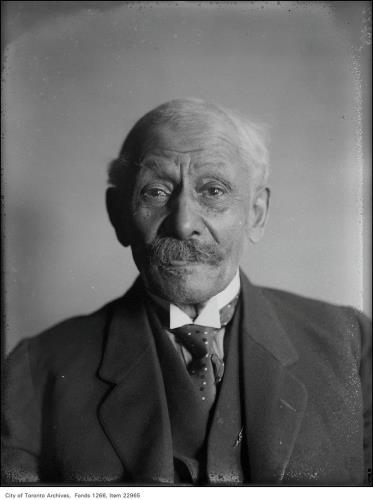
For the week of January 22, 2024.
On January 27, 1842, William Peyton Hubbard was born in Toronto, Canada West (Ontario). He went on to become an inventor, politician, and the first person of African descent to hold public office in Toronto, advocating for democratic reforms and helping to establish public ownership of hydroelectric power in Ontario.
William Peyton Hubbard was born to Lavenia and Mosely Hubbard, who left Virginia and settled in Toronto in 1840. After graduating from the Toronto Model School and completing an apprenticeship, he began a 20-year career as a baker. During this time, he invented the Hubbard Portable Oven, which his brother Charlie patented in 1886 and helped him turn into a successful business. They had designed three different versions of the Hubbard Portable Oven by 1893, all significantly smaller than the common brick oven and manufactured with light metal, which made them easy to move.
Hubbard entered municipal politics in 1893. He had been encouraged to run for office by George Brown, a prominent politician and publisher of the Globe newspaper. Hubbard met Brown by chance while driving for a livery service along the Don River years earlier. Hubbard faced racism in his first campaign to represent Ward 4—an affluent, predominantly white neighbourhood between Bathurst Street and University Avenue. In editorial cartoons, his political opponents exaggerated his racial features, for example. Hubbard lost by a narrow margin but persevered to win election as alderman in 1894.
In 1899, Hubbard was appointed to the Board of Control. This was an executive council of three (later four) politicians, known as controllers, who advised and supported the mayor. Hubbard served again from 1901 to 1904, and during this time successfully advocated for the Board of Control to become an elected body. Voters returned Hubbard to the board in 1905 and his fellow controllers appointed him vice-chairman—a high-ranking position within municipal government, second only to the mayor. Hubbard routinely served as acting mayor in 1906 and 1907, anytime the mayor was absent. Popular throughout the city and amongst his colleagues, Hubbard receiving the most votes of any controller in 1906.
Hubbard made many important contributions to municipal politics. When wealthy laundry owners were lobbying for a significant hike in municipal fees to force smaller operations run by Chinese Canadians out of business, he struck a compromise for gradual increases that the Chinese Canadian entrepreneurs could afford. In 1898, amidst growing antisemitism, he championed a petition on behalf of the Jewish community in Toronto that demanded action to prevent further antisemitic attacks. He also worked with Sir Adam Beck, then MPP of London, to stop the powerful Georgian Bay Ship Canal and Power Aqueduct Company from privatizing Toronto’s water supply in 1907 and campaigned to establish Toronto Hydro-Electric System under public ownership.
His fight for public utilities cost Hubbard the 1908 election. He returned to office in 1913 but retired soon after. William Peyton Hubbard died on April 30, 1935, and was buried in the Toronto Necropolis.
Toronto Power Generating Station was designated as a national historic site in 1983. The Historic Sites and Monuments Board of Canada (HSMBC) advises the Government of Canada on the commemoration of national historic sites, which can include a wide range of historic places such as gardens, complexes of buildings, and cultural landscapes.
The National Program of Historical Commemoration relies on the participation of Canadians in the identification of places, persons, and events of national historic significance. Any member of the public can submit a subject to the Historic Sites and Monuments Board of Canada. Learn how to participate in this process.